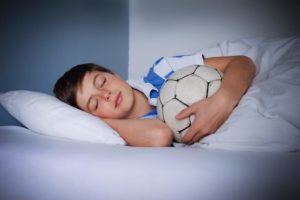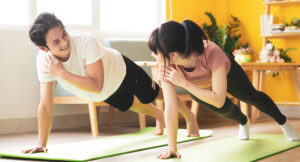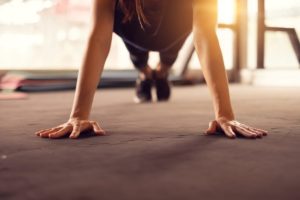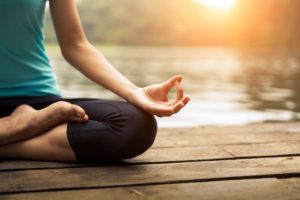Exercise and Sleep
Studies have found that proper exercise can alleviate sleep-related problems and help you get an adequate amount of rest. Recent research also suggests insufficient or poor-quality sleep can lead to lower levels of physical activity the following day.
For these reasons, experts today believe sleep and exercise have a bidirectional relationship. Optimizing your exercise routine can potentially help you sleep better, and getting an adequate amount of sleep may promote healthier physical activity levels during the day.
How Does Exercise Impact Sleep?
There are many benefits to exercising regularly , including a lower risk of diseases like cancer and diabetes, improved physical function, and a higher quality of life. Exercising can also benefit certain groups. For example, pregnant people who engage in routine physical activity are less likely to gain an excessive amount of weight or experience postpartum depression, and older adults who exercise are at lower risk of being injured during a fall.
Exercising also improves sleep for many people. Specifically, moderate to vigorous exercise can increase sleep quality for adults by reducing sleep onset – or the time it takes to fall asleep – and decrease the amount of time they lie awake in bed during the night. Additionally, physical activity can help alleviate daytime sleepiness and, for some people, reduce the need for sleep medications.
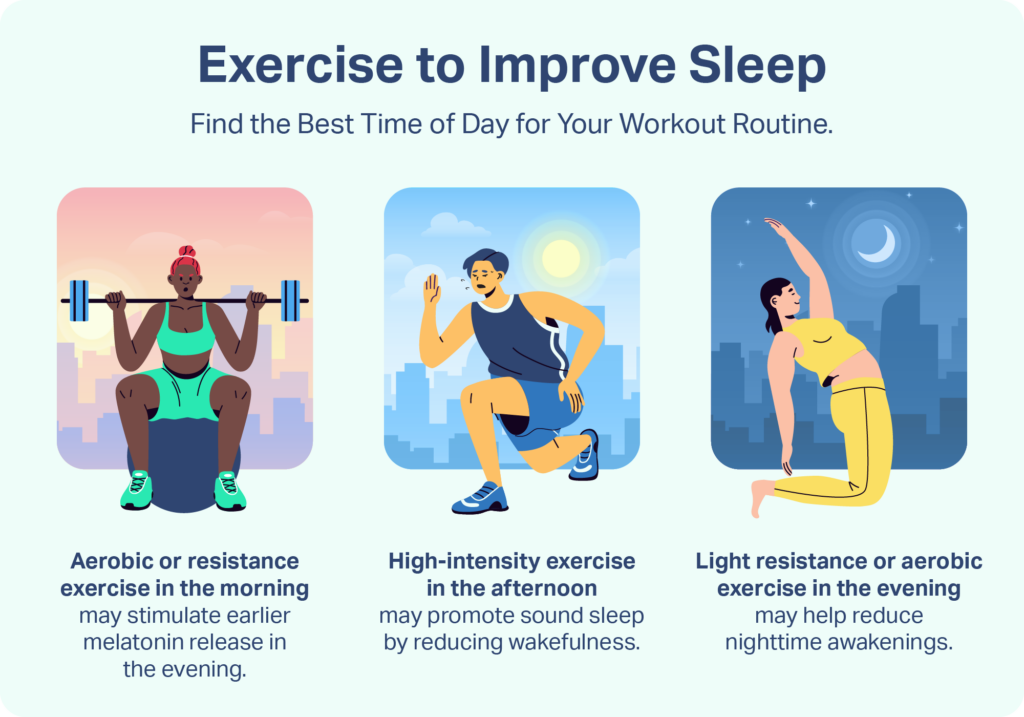
Exercise can also improve sleep in indirect ways. For instance, moderate to vigorous physical activity can decrease the risk of excessive weight gain, which in turn makes that person less likely to experience symptoms of obstructive sleep apnea (OSA). Roughly 60% of moderate to severe OSA cases have been attributed to obesity, though the relationship between weight and sleep apnea is complex.
Many studies and surveys have focused on the effects of exercise for people in various demographic groups. One study profiled college students during their examination periods and found that exercise and physical activity can reduce test-related stress. Another study noted that sleep and exercise are dynamically related for community-dwelling older adults. Additionally, a third study found that regular, mostly aerobic exercise reduced symptoms for people with OSA , even if they did not lose any weight in the process.
Compared to exercise, jobs involving manual labor may not provide the same relief for sleep problems. This may be because many laborious jobs often lead to musculoskeletal aches and pains that can negatively impact sleep. Moreover, manual labor involving long working hours can increase an employee’s risk for stress and fatigue .
Is It Harmful to Exercise Before Bed?
The question of whether exercise in the hours before bedtime contributes to poor-quality sleep has been debated over time. Traditional sleep hygiene dictates that intensive exercise during the three-hour period leading up to sleep can negatively impact sleep because it can increase your heart rate, body temperature, and adrenaline levels. On the other hand, some studies have noted exercising before bed may not produce any negative effects.
The Best Times to Exercise for Healthy Sleep
Survey results among people who exercise late at night have been variable, so you should base your exercise times and intensity on what best suits your sleep schedule. Certain exercises may be more beneficial for sleep than others. These include yoga, light stretching, and breathing exercises.
One survey found that the majority of people who exercise at 8 p.m. or later fall asleep quickly, experience an adequate amount of deep sleep, and wake up feeling well rested. Those who exercise between 4 p.m. and 8 p.m. reported similar percentages for these categories, suggesting late-night exercise may actually benefit some people.
Other studies have yielded similar results. In one, people who exercised in the evening experienced more slow-wave sleep and increased latency for rapid eye movement sleep compared to the control group, as well as less stage 1 (or light) sleep. However, researchers also noted that a higher core temperature – which can occur after intensive workouts – was associated with lower sleep efficiency and more time awake after sleep onset. So while exercising before bedtime may not be inherently harmful, vigorous workouts in the hour leading up to bed can affect sleep efficiency and total sleep time.

How Does Sleep Impact Exercise?
The role sleep plays in physical activity levels has not been studied as thoroughly, and much of the research has focused on differences in physical activity between people with sleep disorders and people with healthier sleep.
However, most of these studies have concluded that those who experience poor sleep are less active than those with healthy sleep cycles. In particular, people with certain sleep disorders are not as likely to exercise during the day. Adults with insomnia tend to be less active than those without insomnia. The same is true for people with OSA and other types of sleep-disordered breathing.
Some studies have noted that nightly shifts in sleep quality, latency, and efficiency can be used to predict physical activity levels. For example, one study found that a 30-minute increase in sleep onset was associated with a one-minute decrease in exercise duration the next day.
A person’s preference for morning or evening activity may also play a role. People who are early risers or “morning people” are more likely to engage in physical activity than those who sleep in or are more active in the evening. In fact, some studies have suggested that exercise can possibly alter one’s diurnal preference over time, and may even shift their circadian rhythms.
Although many studies to date have established a relationship between high-quality sleep and healthy physical activity levels, current research has not conclusively proven that better sleep leads to an increase in physical activity levels.
While specific research varies, health professionals agree that a good night’s sleep can help you feel well rested and more motivated to exercise the following day. However, healthy sleep alone may not be enough to spontaneously change how you engage in physical activity.

Still have questions? Ask our community!
Join our Sleep Care Community — a trusted hub of sleep health professionals, product specialists, and people just like you. Whether you need expert sleep advice for your insomnia or you’re searching for the perfect mattress, we’ve got you covered. Get personalized guidance from the experts who know sleep best.
References
11 Sources
-
U.S. Department of Health and Human Services. (2018). Physical Activity Guidelines for Americans (2nd edition)., Retrieved March 22, 2023, from
https://health.gov/sites/default/files/2019-09/Physical_Activity_Guidelines_2nd_edition.pdf -
Kline C. E. (2014). The bidirectional relationship between exercise and sleep: Implications for exercise adherence and sleep improvement. American journal of lifestyle medicine, 8(6), 375–379.
https://pubmed.ncbi.nlm.nih.gov/25729341/ -
American Academy of Sleep Medicine. (2014). The International Classification of Sleep Disorders – Third Edition (ICSD-3). Darien, IL.
https://aasm.org/ -
Wunsch, K., Kasten, N., & Fuchs, R. (2017). The effect of physical activity on sleep quality, well-being, and affect in academic stress periods. Nature and science of sleep, 9, 117–126.
https://pubmed.ncbi.nlm.nih.gov/28490911/ -
Dzierzewski, J. M., Buman, M. P., Giacobbi, P. R., Jr, Roberts, B. L., Aiken-Morgan, A. T., Marsiske, M., & McCrae, C. S. (2014). Exercise and sleep in community-dwelling older adults: evidence for a reciprocal relationship. Journal of sleep research, 23(1), 61–68.
https://pubmed.ncbi.nlm.nih.gov/23980920/ -
Van Offenwert, E., Vrijsen, B., Belge, C., Troosters, T., Buyse, B., & Testelmans, D. (2019) Physical activity and exercise in obstructive sleep apnea. Acta Clinica Belgica, 74(2), 92-101.
https://www.tandfonline.com/doi/full/10.1080/17843286.2018.1467587 -
Martins, A. J., Vasconcelos, S. P., Skene, D. J., Lowden, A., & de Castro Moreno, C. R. (2016). Effects of physical activity at work and life-style on sleep in workers from an Amazonian Extractivist Reserve. Sleep science (Sao Paulo, Brazil), 9(4), 289–294.
https://pubmed.ncbi.nlm.nih.gov/28154743/ -
Wong, K., Chan, A., & Ngan, S. C. (2019). The Effect of Long Working Hours and Overtime on Occupational Health: A Meta-Analysis of Evidence from 1998 to 2018. International journal of environmental research and public health, 16(12), 2102.
https://pubmed.ncbi.nlm.nih.gov/31200573/ -
Myllymäki, T., Kyröläinen, H., Savolainen, K., Hokka, L., Jakonen, R., Juuti, T., Martinmäki, K., Kaartinen, J., Kinnunen, M. L., & Rusko, H. (2011). Effects of vigorous late-night exercise on sleep quality and cardiac autonomic activity. Journal of Sleep Research, 20(1 Pt 2), 146–153.
https://pubmed.ncbi.nlm.nih.gov/20673290/ -
Youngstedt, S. D., & Kline, C. E. (2006). Epidemiology of exercise and sleep. Sleep and biological rhythms, 4(3), 215–221.
https://pubmed.ncbi.nlm.nih.gov/25374476/ -
Stutz, J., Eiholzer, R., & Spengler, C. M. (2018). Effects of evening exercise on sleep in healthy participants: A systematic review and meta-analysis. Sports Medicine, 49(2), 269–287.
https://pubmed.ncbi.nlm.nih.gov/30374942/




